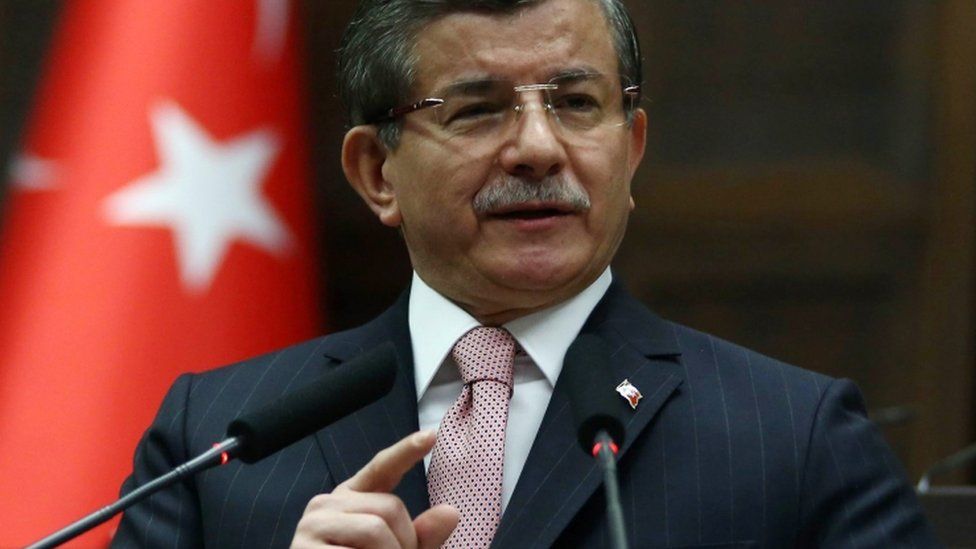Turkey Islam: PM issues secular pledge on new constitution
- Published

Turkey's PM Ahmet Davutoglu has said the country's new constitution will feature the principle of secularism.
He said Turkey's secular and democratic character was "not up for debate".
His comments came a day after a key member of the ruling AK party (AKP) called for secularism to be taken out of the constitution.
Parliamentary speaker Ismail Kahraman, who is overseeing the draft charter, said Turkey was a Muslim country and should have a religious constitution.
Turkey is a Nato member and aspires to join the EU, which has traditionally regarded the country as a model of secular democracy in the Islamic world.
But critics of the government fear the modern state's secular foundations are being eroded.
Opposition parties also fear the new constitution could concentrate too much power in the hands of President Recep Tayyip Erdogan, who wants an executive presidency to replace the current parliamentary system.
'Personal views'
In a speech on Wednesday, Mr Davutoglu said: "Secularism will feature in the new constitution we draft as a principle that guarantees citizens' freedom of religion and faith and that ensures the state is an equal distance from all faith groups."
The deepest faultline: Mark Lowen, BBC News, Istanbul
It is the most sensitive faultline in Turkish society - secularism versus Islamism - and the parliamentary speaker exposed it yet again. Since the 1920s, the Turkish constitution has disavowed a state religion.
Secularists say that allowed Turkey to be embraced by the West and that it is a cornerstone of national identity. But as the Islamists gained power under Mr Erdogan, the balance tipped and the pious now feel today's constitution must reflect their religious identity.
In a country at one with itself, where both sides coexist peacefully, this issue could be discussed in a rational way. But Turkey is so profoundly polarised, so riven by mistrust between supporters and opponents of the government, that the topic has sparked fear and heated debate.
One side says it is a reflection of the fact that Turkey is around 97% Muslim. The other contends it is yet another attempt by an Islamist ruler to shape Turkey.
Mr Kahraman said on Monday: "We are a Muslim country... Secularism cannot feature in the new constitution."
He later said his comments were "personal views".
Kemal Kilicdaroglu, the head of Turkey's main CHP opposition party, condemned Mr Kahraman's comments.
"The chaos that reigns in the Middle East is the product of ways of thinking that, like you, make religion an instrument of politics," he tweeted.
The AKP, which has Islamist roots, has been pushing to replace the existing constitution, which dates back to a 1980 military coup and does not promote any religion.
Over the past two years, the government has lifted bans on women and girls wearing headscarves in schools and civil service. It also limited alcohol sales and made efforts to ban mixed-sex dorms at state universities.
The government has pledged that European standards on human rights will form the basis of the new text.
The AKP holds 317 of the 550 seats in parliament. To submit its draft constitution to a referendum, it would need 330 votes , so it will need to win over lawmakers from other parties.
- Published4 November 2015
- Published22 August 2023
- Published9 October 2013
- Published3 June 2015
- Published2 November 2015